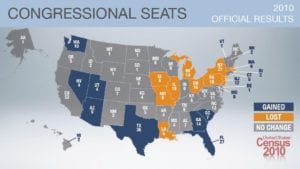To Ask or Not to Ask: Confirming Citizenship on the 2020 Census
Last week, the Trump Administration requested a late addition to the 2020 Census. The Justice Department asked the Department of Commerce to add a question on this upcoming Census regarding citizenship, which was subsequently approved by the Secretary of Commerce. Specifically, the question would require individuals and families to confirm they are U.S. citizens, but will not require individuals to state if they are legally or illegally in the United States.
The decision to add a citizenship question to the 2020 Census has caused uproar from the Democratic Party and support, or silence, from most Republicans. However, beyond the political divisiveness and implications in Washington, D.C., adding this question to the Census could have a big impact on communities across the United States.

Our California immigration lawyers answer the most important questions about a citizenship question on the 2020 Census, including why the addition is important, what impact it could have, and your options for completing the Census in two years.
What Basic Census Information Should You Know?
Every 10 years the United States government endeavors to count every resident in the United States through a questionnaire process called the census. The U.S. Census Bureau puts together a set of questions regarding residence, number of dependents and children in the household, and other specific household questions. The overall goal is to determine the exact dispersal of the U.S. population.
Only one member of each household, the head of the household, needs to return the census by mail, or in 2020, in an electronic format. The U.S. Census Bureau broadly utilizes and charts the data, but it is illegal for the personal information and individual responses to be shared with other federal agencies, including Immigration and Customs Enforcement.

The results of the census are crucial for future government and equal representation. Based on the census data, the federal government determines how many seats each state is awarded in the U.S. House of Representatives. California specific information and regional data are also utilized to determine the distribution of federal funds. An estimated $675 billion in funds is divvied up for infrastructure and services, such as hospitals, schools, and emergency services.
Why Is There Push Back to a Citizenship Question?
In 2010 the U.S. Census Bureau received its highest rate of response to the census, with nearly 74% of the population completing the questionnaire and submitting data. This high rate of return should equate to greater accuracy in the distribution of federal funds and seats in the U.S. House of Representatives.
Critics of putting a citizenship question on the census fear that asking households to report their citizenship status will skew the data. The concern is families that are uncertain of their status in the United States may answer inaccurately. There is equal fear that other households, such as those with undocumented individuals, may not respond at all.
The communities where this is more likely to happen, specifically those with a high number of immigrants, will report a far lower number of residents than actually living there. Subsequently, the amount of federal funding won’t reflect the need within these communities.
Alternatively, advocates for a citizenship question argue that its inclusion will lead to a better understanding of the U.S. population. There is a parallel argument that a citizenship question leads to improved transparency and also provides the federal government with more information on the overall population.
Should You Be Concerned About a Citizenship Question?
Whether you are concerned about the addition of a citizenship question on the 2020 Census or not is likely tied to your specific circumstances and immigration situation. California and Los Angeles, in particular, have high immigrant populations. Not all members of this population are in the United State legally and others have concerns or questions over the continued status of their residency. It is possible that given these concerns, it is better not to provide a census response.
If you have specific questions about your immigration status or steps to solidify your immigration status in the United States, California immigration lawyers, like those at Greco Neyland, can help. We assist with a wide range of immigration issues in Southern California, including deportation defense and applications for citizenship. To speak with a member of the Greco Neyland team, simply contact our LA office at 213-295-3500.
The information in this blog post (“Post”) is provided for general informational purposes only. This Post may not reflect the current law in your jurisdiction. No information contained in this Post should be construed as legal advice from Greco Neyland Attorneys at Law or the individual author, nor is it intended to be a substitute for legal counsel on any subject matter.
To Ask or Not to Ask: Confirming Citizenship on the 2020 Census
Last week, the Trump Administration requested a late addition to the 2020 Census. The Justice Department asked the Department of Commerce to add a question on this upcoming Census regarding citizenship, which was subsequently approved by the Secretary of Commerce. Specifically, the question would require individuals and families to confirm they are U.S. citizens, but will not require individuals to state if they are legally or illegally in the United States.
The decision to add a citizenship question to the 2020 Census has caused uproar from the Democratic Party and support, or silence, from most Republicans. However, beyond the political divisiveness and implications in Washington, D.C., adding this question to the Census could have a big impact on communities across the United States.

Our California immigration lawyers answer the most important questions about a citizenship question on the 2020 Census, including why the addition is important, what impact it could have, and your options for completing the Census in two years.
What Basic Census Information Should You Know?
Every 10 years the United States government endeavors to count every resident in the United States through a questionnaire process called the census. The U.S. Census Bureau puts together a set of questions regarding residence, number of dependents and children in the household, and other specific household questions. The overall goal is to determine the exact dispersal of the U.S. population.
Only one member of each household, the head of the household, needs to return the census by mail, or in 2020, in an electronic format. The U.S. Census Bureau broadly utilizes and charts the data, but it is illegal for the personal information and individual responses to be shared with other federal agencies, including Immigration and Customs Enforcement.

The results of the census are crucial for future government and equal representation. Based on the census data, the federal government determines how many seats each state is awarded in the U.S. House of Representatives. California specific information and regional data are also utilized to determine the distribution of federal funds. An estimated $675 billion in funds is divvied up for infrastructure and services, such as hospitals, schools, and emergency services.
Why Is There Push Back to a Citizenship Question?
In 2010 the U.S. Census Bureau received its highest rate of response to the census, with nearly 74% of the population completing the questionnaire and submitting data. This high rate of return should equate to greater accuracy in the distribution of federal funds and seats in the U.S. House of Representatives.
Critics of putting a citizenship question on the census fear that asking households to report their citizenship status will skew the data. The concern is families that are uncertain of their status in the United States may answer inaccurately. There is equal fear that other households, such as those with undocumented individuals, may not respond at all.
The communities where this is more likely to happen, specifically those with a high number of immigrants, will report a far lower number of residents than actually living there. Subsequently, the amount of federal funding won’t reflect the need within these communities.
Alternatively, advocates for a citizenship question argue that its inclusion will lead to a better understanding of the U.S. population. There is a parallel argument that a citizenship question leads to improved transparency and also provides the federal government with more information on the overall population.
Should You Be Concerned About a Citizenship Question?
Whether you are concerned about the addition of a citizenship question on the 2020 Census or not is likely tied to your specific circumstances and immigration situation. California and Los Angeles, in particular, have high immigrant populations. Not all members of this population are in the United State legally and others have concerns or questions over the continued status of their residency. It is possible that given these concerns, it is better not to provide a census response.
If you have specific questions about your immigration status or steps to solidify your immigration status in the United States, California immigration lawyers, like those at Greco Neyland, can help. We assist with a wide range of immigration issues in Southern California, including deportation defense and applications for citizenship. To speak with a member of the Greco Neyland team, simply contact our LA office at 213-295-3500.
The information in this blog post (“Post”) is provided for general informational purposes only. This Post may not reflect the current law in your jurisdiction. No information contained in this Post should be construed as legal advice from Greco Neyland Attorneys at Law or the individual author, nor is it intended to be a substitute for legal counsel on any subject matter.
free case evaluation
Results That Matter to You




